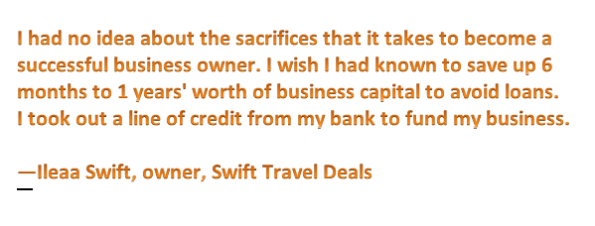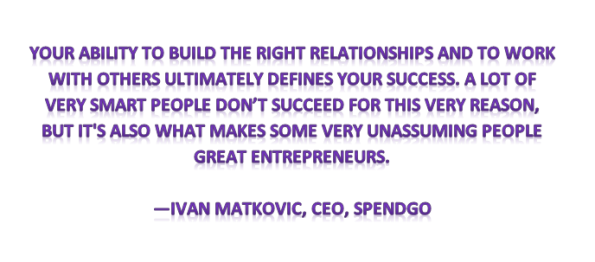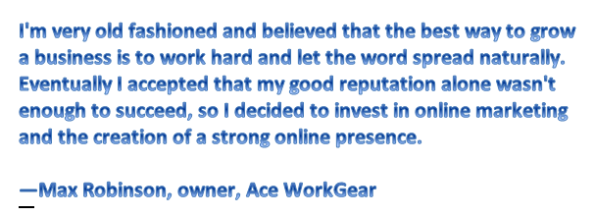When the entrepreneurial spirit grabs you, it’s so tempting to jump right in and just go for it. You have great products or services (the greatest!). You have big ideas and vision (the biggest!). Your raw enthusiasm will get your business up, running, and profitable in no time, right? (It’s going to be amazing, believe me. Big league!)
OK, let’s journey back to reality for a moment. Every prospective small business owner starts off with great ideas, inspiration, and rabid enthusiasm. That’s an important given. But every business owner hits unexpected bumps and detours that can slow or even derail success. And many business owners unnecessarily reinvent the wheel entirely too many times.

Learning from those who have paved the way can help budding entrepreneurs avoid those time-and-money-wasting mistakes. We asked small business owners to submit the one or two pieces of advice they wish someone had told them before they began their life as an entrepreneur.
This non-comprehensive list of random advice touches on a range of topics including: online marketing, business partners, employees, timing, funding, and business processes. Read through all the great advice, or click on the links below to go to a specific category.
- Online Marketing and PR
- Partners and Employees
- Business Timing
- Funding Your Business
- P is For Process
Online Marketing and PR
Learn how to evaluate Internet marketing companies. If you don’t know exactly what you’re doing, it’s easy to waste thousands of dollars on marketing that leads you nowhere. If a friend asked for advice about finding marketing companies, I’d say look at the marketing company’s past work and see if their marketing efforts are still paying off.
If you want to evaluate even further, you can call online businesses they’ve worked with and ask for their opinion of their marketing company. As long as they aren’t one of your competitors it shouldn’t be a big deal.
—Alex Reichmann, CEO, iTestCash
I’m very old fashioned and believed that the best way to grow a business is to work hard and let the word spread naturally. Eventually I accepted that my good reputation alone wasn’t enough to succeed, so I decided to invest in online marketing and the creation of a strong online presence.
The immediate growth that we experienced (despite the low cost) by investing time into social medixa and regular blog posts really opened my eyes to the importance of a strong online presence, regardless of what type of company you run.
—Max Robinson, owner, WorkGear UK
The piece of advice I wish someone had told me before I started my company is to get as much PR as humanly possible. I didn’t start working on PR until I was four years in, and now it’s starting to pay off in a big way. I feel like I wasted the first four years just barely treading water.
Ben Walker, CEO, Transcription Outsourcing
Pick only two social media platforms and work on them. When you’re a new small business owner, you can’t always hire staff, and maintaining numerous social media platforms is overwhelming. Yes, you can use services to upload posts in advance, but you still have to create the posts. Two social media accounts have served my needs. I wish someone had told me sooner, but at least I get to warn someone coming up after me.
—Antoinette Rodney, founder, The Word Changes
It’s not too romantic but, honestly, figure out SEO and get moving on that now. It took me eight months to address SEO, and my life would have been so much easier if I done it from the start. Sales solve everything.
—Michael Mason, owner, executive producer, Perfect Chaos Films

Partners and Employees
The best piece of start-up advice I ever received was from my father. He spoke to me about placing expectations on other people. If you don’t have any expectations for others, you can never be disappointed. This might sound grim or sad, but at the core it’s a belief in self-reliance. It taught me the importance on getting the job done without a helping hand. It also taught me to appreciate the people who actually come through for me.
—Sebastien Dupéré, owner, president, and CEO, Dupray
The biggest revelation for me was just how much I had to rely on other people. If you have the entrepreneurial mindset, you’re usually very confident in your individual abilities. However, no matter how talented you are or how many hours you put in, eventually—and frequently—you’ll need to rely someone else.
Your ability to build the right relationships and to work with others ultimately defines your success. A lot of very smart people don’t succeed for this very reason, but it’s also what makes some very unassuming people great entrepreneurs.
—Ivan Matkovic, CEO, Spendgo
I wish someone had warned me that partnerships can be rocky and to protect myself—especially in structuring the business and the bank accounts. I should have set up banking that required both of us to sign for withdrawals and deposits to avoid the problems I encountered. One smart thing I did was to create a C corporation, which provided a level of protection.
—Erika Montgomery, CEO, Three Girls Media
I started my company 15 years ago, and the hardest lesson I learned was not getting rid of weak people right away. I spent more time managing them than finding new customers. I knew in my gut they weren’t up to snuff, but out of loyalty to them I kept them around far too long. As soon as I let them go the company culture grew stronger. My advice: hire slowly and fire quickly.
—Paige Arnof-Fenn, founder and CEO, Mavens & Moguls
I wish someone had told me the importance of surrounding myself with the right team. As a trained architect, I had no idea what I was getting into building a technology business. I walked in circles for more than a year trying to figure out how to build my business. Two guys came on board to help me, and I couldn’t have made a worse choice of a team in my life. They’re no longer involved in my business, but they own nearly 20 percent equity.
The technical aspect of my business has been one of my bigger challenges. Not having a good CTO cost my company $30,000 in lost revenue. I now have a CTO on board who’s helped facilitate and finance the new face and technology behind my company. Lesson learned: your team is everything.
—Lori Cheek, founder and CEO, Cheekd
Find a trustworthy business partner. Managing a business is difficult: You have to deal with unexpected issues on a regular basis. You’ll wish you had 48 hours in a day. You have to handle decisions that could make or break your small company. You get completely sucked into your job, and your personal life can suffer. It helps to have someone who can put things in perspective, someone with whom you can vent and celebrate, as needed. For all of these reasons, don’t go solo. Get a co-pilot as soon as possible.
—Federico Cucchi, co-owner and CSO, My Beauty Matches
The advice I give to aspiring small-business owners is to surround themselves with the right people. We built my boot-strapped startup from the bottom up. We started off slowly, but business picked up after I brought in an experienced accountant and started building the company top down.
—Zondra Wilson, president and CEO, Blu Skin Care
Business Timing
My best advice to prospective small business owners: You won’t always know what to do every day, but get up and do something that moves you forward. Doing nothing gets you nowhere.
Starting a small business is incredibly challenging and you’re the best—and the worst—boss you will ever have. I’ve been through this process multiple times personally, and I’ve walked many clients through it as well; situational paralysis will cripple you.
—Erica B. McCurdy, Managing Member, McCurdy Life Coach

I wish someone told me that building a successful business takes much longer than you think—and that’s OK. I had this idea of what success meant, and I was just sure I could do it in a certain length of time. There are no overnight successes. It’s a lot of hard work, and sometimes you go two steps forward only to go back a step. You’ll get there in the end, and it’s so worth it when you do.
—Zondra Wilson, president and CEO, Blu Skin Care
Before you start your business activity, consider the timing carefully. We started our business in December 2012. Unfortunately, the state of California says that no matter what point in time you start business activity during a year, you have to pay the required minimum LLC fee for that year.
That silly mistake cost our fledgling business $800, which we could have easily avoided. I recommend that prospective business owners research the guidelines for state fees and taxes beforechoosing a date to start their business.
—Lindsey Handley, Ph.D., co-founder and COO, ThoughtSTEM
Before I started my company, I wish I had known exactly how much patience I would need. It often takes much longer for things to come together than you anticipate. For example, we thought customer acquisition would happen more quickly; but you must stay patient. It’s a process, and you have to apply the information from each new lesson. That patience will ultimately lead to the success of your small business.
—Sagi Gidali, co-founder and CPO, SaferVPN
If I ever had to start my business all over again, I would start it while working for someone else. Start your business on a part-time basis, and build your client base. When you have enough money coming in to at least cover your bills, then you can quit your job and do your business full time. Otherwise, you will run up a lot of debt. And how ever long you think it will take to start being profitable, double it.
—Rob Bedell, owner, Bedell Media & Consulting
Funding Your Business
I had no idea about the sacrifices that it takes to become a successful business owner. I wish I had known to save up 6 months to 1 years’ worth of business capital to avoid loans. I took out a line of credit from my bank to fund my business.
I was lucky—my business thrived, and I was able to pay it back. But I recommend saving for your business first. Use that money to run your business in the beginning before taking out a major loan. It’s hard enough if your business doesn’t succeed, but at least you won’t be stuck having to pay back a ton of money.
—Ileaa Swift, owner, Swift Travel Deals
Before you start your small business, have an emergency fund in place. As a business owner, there are times when payments come in late, you have unexpected expenses, or other emergencies arise. If you have an emergency fund in place, it lets you weather cash flow issues without panicking. Without an emergency fund, you risk taking on jobs and clients that aren’t in your best interest—or even go into debt to stay afloat, which can create a vicious cycle.
—Lori Soard, owner, Promo Warriors
You know the amount of money you think you’ll need to start your business? Double it. I estimated $150k to start my small business, and in reality I needed twice that much. In other words, I spent $300k before I reached profitability and could pay myself a living wage. It all worked out in the end, but I wish I had saved or borrowed twice as much in the beginning—it would have made my life a lot easier.
—Nick Braun, Founder & CEO, Pet Insurance Quotes
P is For Process (Among Other Things)
When I started my business, I wish I had known to build system processes right from the start. It took us nearly five years of doing tasks repeatedly before we documented processes. Since then, we’ve created checklists for nearly every business process, from hiring, on-boarding, marketing, problem resolution, and client communication.
Beyond the obvious cost and time savings, the systematized processes let us present a uniform impression to our clients. That perception gives our clients comfort about our stability as a business partner—a critical element in earning their business and keeping it for the long term.
—Ivan Mladenović, president and CEO, Preemo
Run your small business like a big company right from the beginning. Lay your groundwork early and have clearly defined processes and procedures in place. When you experience periods of rapid growth, your business will be organized, and you can focus on your customer service instead of organizational tasks.
—Courtney Barbee, owner, The Bookkeeper
When I started my lawn business, I failed to correctly identify my company’s value proposition. Until I understood what would compel people to say yes to my service, all my marketing effort was like pouring gasoline on wet leaves.
I initially thought people would like our service due to its lower cost. But testing in different channels such as ad-words and Facebook showed that same-day service drives more visitors and more conversions on our landing pages. Bottom line: nailing your value prop first is crucial.
—Bryan Clayton, CEO, GreenPal
Keep a tight, cohesive product line. It’s tempting to try to please everyone and offer a large variety of options and product types. However, this is problematic in terms of keeping in-stock inventory and raw materials—especially in the handcrafted world.
Consumers get overwhelmed by too many choices and take their business where they feel more in control of their buying experience. Had I known this in the beginning, our initial product line would have looked very different, and we would have saved a lot of misplaced effort and attention.
—Carrie Seibert, owner, Soap Commander
Lauren Simonds is the managing editor of SmallBusinessComputing.com. Follow her on Twitter.
| Do you have a comment or question about this article or other small business topics in general? Speak out in the SmallBusinessComputing.com Forums. Join the discussion today! |

